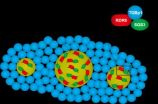(Press-News.org) A seven-year study of women who take antipsychotic medication while pregnant, proves it can affect babies.
The observational study, published in the journal PLOS ONE, reveals that whilst most women gave birth to healthy babies, the use of mood stabilisers or higher doses of antipsychotics during pregnancy increased the need for special care after birth with 43 per cent of babies placed in a Special Care Nursery (SCN) or a Neonatal Intensive Care Unit (NICU), almost three times the national rate in Australia.
As well as an increased likelihood of the need for intensive care, the world-first study by experts from the Monash Alfred Psychiatry Research Centre (MAPrc) and Monash University, shows antipsychotic drugs affects babies in other ways; 18 per cent were born prematurely, 37 per cent showed signs of respiratory distress and 15 per cent developed withdrawal symptoms.
Principal investigator, Professor Jayashri Kulkarni, Director of MAPrc, said the study highlights the need for clearer health guidelines when antipsychotic drugs are taken during pregnancy.
"There's been little research on antipsychotic medication during pregnancy and if it affects babies. The lack of data has made it very difficult for clinicians to say anything conclusively on how safe it is for babies," Professor Kulkarni said.
"This new research confirms that most babies are born healthy, but many experience neonatal problems such as respiratory distress."
With no existing data to draw on, MAPrc established the world-first National Register of Antipsychotic Medications in Pregnancy (NRAMP) in 2005. Women who were pregnant and taking antipsychotic medication were recruited from around Australia through clinical networks in each state and territory. In all 147 women were interviewed every six weeks during pregnancy and then followed until their babies were one year old.
Antipsychotic drugs are currently used to treat a range of psychiatric disorders including schizophrenia, major depression and bipolar disorder. About 20 per cent of Australian women experience depression in their lifetime, compared to 10 per cent of men. In Australia 25 per cent of women experience postnatal depression and 20 per cent experience severe menopausal depression.
Women have much higher rates of anxiety disorders and there are equal percentages of men and women with schizophrenia (2 per cent) and bipolar disorder (about 3 per cent).
Professor Kulkarni said the emergence of new antipsychotic drugs means that many women with a well controlled psychiatric disorder are able to contemplate having babies, but there have always been concerns about the effect of treatment on their offspring.
"The potentially harmful effects of taking an antipsychotic drug in pregnancy have to be balanced against the harm of untreated psychotic illness. The good news is we now know there are no clear associations with specific congenital abnormalities and these drugs," Professor Kulkarni said.
"However clinicians should be particularly mindful of neonatal problems such as respiratory distress, so it's critical that Neonatal Intensive Care Units, or Special Care Nurseries are available for these babies."
INFORMATION: END
Antipsychotic medication during pregnancy does affect babies, study shows
2014-06-02
ELSE PRESS RELEASES FROM THIS DATE:
Neuron tells stem cells to grow new neurons
2014-06-02
DURHAM, N.C. -- Duke researchers have found a new type of neuron in the adult brain that is capable of telling stem cells to make more new neurons. Though the experiments are in their early stages, the finding opens the tantalizing possibility that the brain may be able to repair itself from within.
Neuroscientists have suspected for some time that the brain has some capacity to direct the manufacturing of new neurons, but it was difficult to determine where these instructions are coming from, explains Chay Kuo, M.D. Ph.D., an assistant professor of cell biology, neurobiology ...
Hypnosis extends restorative slow-wave sleep
2014-06-02
Sleeping well is a crucial factor contributing to our physical and mental restoration. SWS in particular has a positive impact for instance on memory and the functioning of the immune system. During periods of SWS, growth hormones are secreted, cell repair is promoted and the defence system is stimulated. If you feel sick or have had a hard working day, you often simply want to get some good, deep sleep. A wish that you can't influence through your own will – so the widely held preconception.
Sleep researchers from the Universities of Zurich and Fribourg now prove ...
Poor sleep equal to binge drinking, marijuana use in predicting academic problems
2014-06-02
DARIEN, IL – A new study shows that college students who are poor sleepers are much more likely to earn worse grades and withdraw from a course than healthy sleeping peers.
Results show that sleep timing and maintenance problems in college students are a strong predictor of academic problems even after controlling for other factors that contribute to academic success, such as clinical depression, feeling isolated, and diagnosis with a learning disability or chronic health issue. The study also found that sleep problems have about the same impact on grade point average ...
NUS scientists demonstrate rare chemical phenomenon to harvest solar energy
2014-06-02
A team of international scientists led by Professor Jagadese J Vittal of the Department of Chemistry at the National University of Singapore's (NUS) Faculty of Science has successfully unraveled the chemical reaction responsible for propelling microscopic crystals to leap distances up to hundreds of times their own size when they are exposed to ultraviolet (UV) light.
This popping effect, akin to the bursting of popcorn kernels at high temperatures, demonstrates the conversion of light into mechanical motion. It is the first instance of a "photosalient effect" driven ...
Half of pregnant women who have hypertension and snore unknowingly have a sleep disorder
2014-06-02
ANN ARBOR, Mich. — 1 in 2 hypertensive pregnant women who habitually snore may have unrecognized obstructive sleep apnea, a sleeping disorder that can reduce blood oxygen levels during the night and that has been linked to serious health conditions, new University of Michigan-led research shows.
One in four hypertensive pregnant women who don't snore also unknowingly suffer from the sleeping disorder, according to the study that appears in the British Journal of Obstetrics and Gynecology.
"We know that habitual snoring is linked with poor pregnancy outcomes for both ...
Marijuana use is associated with impaired sleep quality
2014-06-02
DARIEN, IL – A new study suggests that marijuana use is associated with impaired sleep quality.
Results show that any history of cannabis use was associated with an increased likelihood of reporting difficulty falling asleep, struggling to maintain sleep, experiencing non-restorative sleep, and feeling daytime sleepiness. The strongest association was found in adults who started marijuana use before age 15; they were about twice as likely to have severe problems falling asleep (odds ratio = 2.28), experiencing non-restorative sleep (OR = 2.25) and feeling overly sleepy ...
Even at infancy, human can visually identify objects that stand out: York U study
2014-06-02
TORONTO, June 2, 2014 — Even by three months of age, babies are visually able to locate objects that stand out from a group, a York University study has found.
"For example, an infant can pick a red umbrella in a sea of grey ones," says Psychology Professor Scott Adler in the Faculty of Health, who led the research. "This indicates that babies at a very young age are able to selectively extract information from the environment, just like adults."
Previously it was unknown how early this form of visual attention developed in infants. For the current study, both infants ...
MRSA rates varied dramatically across geographic areas
2014-06-02
LOS ANGELES – (June 2, 2014) – The rates of community-onset methicillin-resistant Staphylococcus aureus (CO-MRSA) varied dramatically among academic medical centers in California, New York, Illinois and North Carolina, suggesting there is not a uniform change in the "national epidemic" of the "superbug" that has generated extensive public health concern over the past decade, according to a new study.
The study, published online ahead of print in the journal Clinical Infectious Diseases, surveyed hospital records of 4,171 cases of MRSA and MRSA-related infections between ...
Enzyme used in antidepressants could help researchers develop prostate cancer treatments
2014-06-02
LOS ANGELES (May 30, 2014) – An international team of scientists including researchers at the Cedars-Sinai Samuel Oschin Comprehensive Cancer Institute and the University of Southern California found that an enzyme commonly used as a target for antidepressants may also promote prostate cancer growth.
The study, published in the Journal of Clinical Investigation, found that suppressing the enzyme monoamine oxidase A, or MAOA, may reduce or even eliminate prostate tumor growth and metastasis in laboratory mice. The finding could open the door for physicians to use antidepressants ...
Virus rounds up enzymes, disarms plant
2014-06-02
University of Tokyo researchers have described how a plant-virus protein suppresses an important plant defense mechanism that remembers viral genetic information, providing a new target for developing the first-ever chemical against plant viruses that globally cause more than $60 billion of crop losses each year.
Invading viruses carry genetic material that hijacks the host cell's machinery, fooling it into producing proteins and new viruses. All cells from fungi to plants and mammals employ RNA silencing, a cellular process essential for the regulation of gene expression ...




